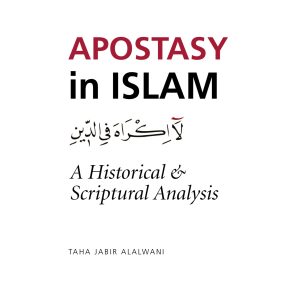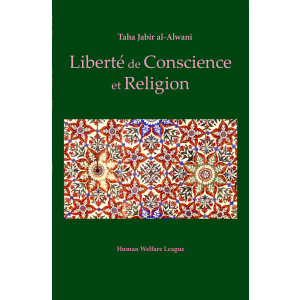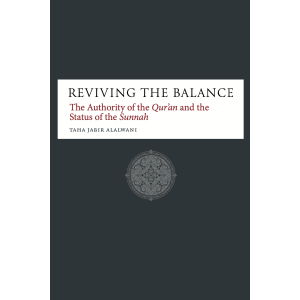-
Apostasy in Islam: A Historical and Scriptural Analysis
$0Overview
What is the legally prescribed penalty, if any, for apostasy (alriddah), and how does this relate to the demand for religious tolerance as stipulated in verse 2:256 of the Qur’an “There shall be no compulsion in matters of faith”? It is an established fact that the Prophet never, in his entire life, put an apostate to death. Yet, the issue remains one of the most controversial to have afflicted the Muslim world down the centuries. It is also the source of much damaging media coverage today as Islamic jurisprudence stands accused of a flagrant disregard for human rights and freedom of expression. The subject of this book is a highly sensitive and important one. The author rightly concentrates on evidence, to examine the historical origins of the debate in rigorous detail, as well as the many moral and contextual issues surrounding it. Disputing arguments put forward by proponents of the death penalty he contends that both the Qur’an and the Sunnah promote freedom of belief including the act of exiting the Faith and do not support capital punishment for the sin of alriddah. Note that attention is on the word sin, for there is qualification: as long as one’s apostasy has not been accompanied by anything else that would be deemed a criminal act, particularly in terms of national security, then according to the author, it remains a matter strictly between God and the individual. Of interest is the fact that the Qur’an significantly refers to individuals repeatedly returning to unbelief after having believed, but does not mention that they should be killed or punished. This work has been written at a time of great complexity and vulnerability when a true understanding of the higher intents and values of the Qur’an and the Sunnah, maqasid alshariah, is sorely needed. The author employs a strong evidence based approach examining in detail the Qur’an and authentic Hadith, taking into consideration traditional approaches to the study of the Islamic textual sciences and other fields of knowledge, as well as analyzing scholastic interpretation. Taking the life of a person without just cause is according to the Qur’an equivalent to the killing of the whole of mankind. It is vital therefore, that in the interests of compassion and justice, as well as freedom of belief, this subject is clearly addressed once and for all.
-
Liberté de Conscience et Religion
$4Overview
Liberte de Conscience et Religion:Ce livre traite d’un sujet qui, ces dernieres annees , avait souleve un tolle a l’echelle internationale, surtout dans les medias occidentaux face a la condamnation de Abu Al Mannan en Afghanistan , l’execution de Mohammad Taha au Soudan et l’affaire Rushdie.
L’auteur prend position contre toute peine legale a l’egard de l’apostasie et se justifie meme en produisant des preuves incontestables dans le Coran et les Hadiths. Ce livre nous invite a un debat stimulant pour tous ceux qui se passionnent pour la chose legale.
“Pas de contrainte en religion”, enonce le Coran: Proclamation de la liberte humaine, principe fundamental de liberte d’agir, de penser et d’expression!
Taha Jabir Alalwani (1935-2016), diplômé de l’Université Al-Azhar, est un spécialiste de renommé internationale et un experte dans les domaines de la théorie juridique islamique, de la jurisprudence (fiqh) et de usul al-fiqh. Il est l’auteur de nombreuses oeuvres et a été membre de l’Académie islamique du fiqh de l’OCI et président de l’Université de Cordoba à Ashburn, en Virginie, aux États-Unis -
Reviving The Balance: The Authority of The Qur’an and The Status of The Sunnah
$0Overview
This work studies the position of the Sunnah in Islam and its fundamental relationship to the Qur’an. The author carefully examines the sensitive issue of the development of the oral and written traditions, the problems scholars faced despite painstaking work verifying the authenticity of reports, the character of narrators, etc. and the evergrowing complexity of a body of narratives that were making the simplicity and clarity of the Prophet’s life, words, and actions, a burgeoning maze of information. Taking the praiseworthy intention and effort to emulate the Prophet into account, the author nevertheless makes the case that once the Sunnah had been collected, the Muslim community began to neglect the Qur’an in favor of narrations of what the Prophet had done and said on the pretext that such narratives “contained” the Qur’an. Eventually they then abandoned the Sunnah narratives in favor of Islamic jurisprudence on the pretext that Islamic juristic texts tacitly included both the Qur’an and the Sunnah. It is with the aim of restoring the relationship between the two that this work has been written, that is, the Prophetic Sunnah must be tied inextricably to the Qur’an in a way that allows for no contradiction or conflict between the two, to avoid misapplication and abuse of hadith, and to meet the requirements and challenges of a new age.




